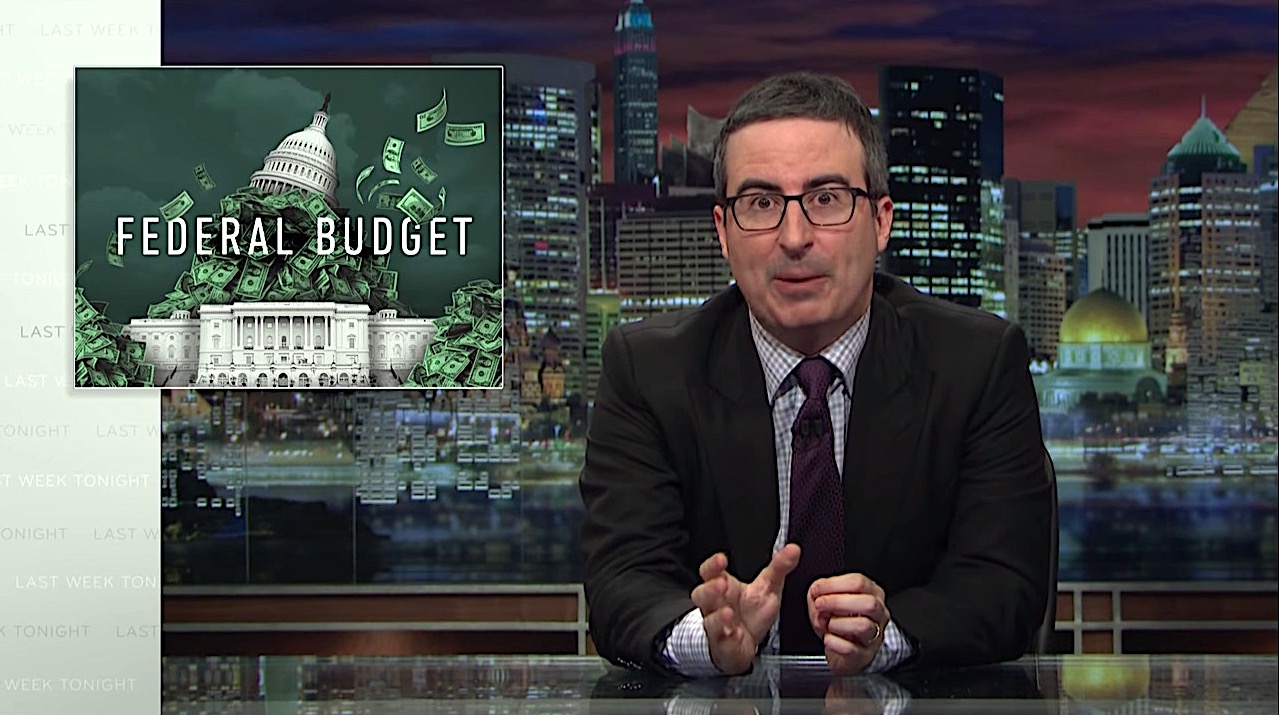John Oliver explains how Trump's budget would, ironically, turn red states into literal 'flyover country'


A free daily email with the biggest news stories of the day – and the best features from TheWeek.com
You are now subscribed
Your newsletter sign-up was successful
Last week, President Trump unveiled his first budget. On Sunday's Last Week Tonight, John Oliver ran through why that does and doesn't matter. "This budget is simply a blueprint, what's known in Washington as a 'skinny budget' — which sounds like a line item that Trump might have included in one of his pre-nups," he said. But while it's "very unlikely to pass in its current form, it is worth taking just a few minutes to look at it — partly because it gives us a clear sense of our president's priorities, but also because it gives us chance to get to know yet another one of the Trump administration's key characters," White House budget director Mick Mulvaney.
Mulvaney said he came up with the budget figures by going back through Trump's speeches — essentially treating "Trump's past statements the way Trump treats women: randomly singling out a few of them and then reducing them down to numbers," Oliver said. But "translating the noises that come out of Trump's face into hard policy prescriptions is almost impossible," he added, playing some of Trump's relevant musings, describing the language as "toddler psychopath."
"Look, there is nothing wrong with cuts in principle, but with budgets, as with haircuts, it's where and how you cut that matters," Oliver said. For example, you don't slash the EPA, State Department, USAID, public broadcasting, and the National Endowments for the Arts and Humanities as a cost-cutting measure — together they make up 1.62 percent of the federal budget — you cut them as a proffered middle finger. "It is the budgetary equivalent of inviting Mitt Romney out to dinner at Jean-Georges before not offering him a Cabinet position — and I will say, that was awesome, by the way," Oliver said, appreciatively. "Trump is so consistently monstrous, sometimes out of sheer coincidence he happens to do something amazing."
The Week
Escape your echo chamber. Get the facts behind the news, plus analysis from multiple perspectives.

Sign up for The Week's Free Newsletters
From our morning news briefing to a weekly Good News Newsletter, get the best of The Week delivered directly to your inbox.
From our morning news briefing to a weekly Good News Newsletter, get the best of The Week delivered directly to your inbox.
But "the weirdest thing of all here: Some of the cuts in Trump's budget heavily impact groups that voted for him," Oliver said, noting in particular the proposed existential cuts to rural airport subsidies. "Think about that," he said. "Trump's rise was fueled by people in red states who were justifiably irritated that liberals sometimes refer to them as 'flyover country.' But this budget could literally turn some of them into flyover country, because there would be no other option." Watch below — with the caveat that there is NSFW language throughout. Peter Weber
A free daily email with the biggest news stories of the day – and the best features from TheWeek.com
Peter has worked as a news and culture writer and editor at The Week since the site's launch in 2008. He covers politics, world affairs, religion and cultural currents. His journalism career began as a copy editor at a financial newswire and has included editorial positions at The New York Times Magazine, Facts on File, and Oregon State University.
-
 James Van Der Beek obituary: fresh-faced Dawson’s Creek star
James Van Der Beek obituary: fresh-faced Dawson’s Creek starIn The Spotlight Van Der Beek fronted one of the most successful teen dramas of the 90s – but his Dawson fame proved a double-edged sword
-
 Is Andrew’s arrest the end for the monarchy?
Is Andrew’s arrest the end for the monarchy?Today's Big Question The King has distanced the Royal Family from his disgraced brother but a ‘fit of revolutionary disgust’ could still wipe them out
-
 Quiz of The Week: 14 – 20 February
Quiz of The Week: 14 – 20 FebruaryQuiz Have you been paying attention to The Week’s news?
-
 TikTok secures deal to remain in US
TikTok secures deal to remain in USSpeed Read ByteDance will form a US version of the popular video-sharing platform
-
 Unemployment rate ticks up amid fall job losses
Unemployment rate ticks up amid fall job lossesSpeed Read Data released by the Commerce Department indicates ‘one of the weakest American labor markets in years’
-
 US mints final penny after 232-year run
US mints final penny after 232-year runSpeed Read Production of the one-cent coin has ended
-
 Warner Bros. explores sale amid Paramount bids
Warner Bros. explores sale amid Paramount bidsSpeed Read The media giant, home to HBO and DC Studios, has received interest from multiple buying parties
-
 Gold tops $4K per ounce, signaling financial unease
Gold tops $4K per ounce, signaling financial uneaseSpeed Read Investors are worried about President Donald Trump’s trade war
-
 Electronic Arts to go private in record $55B deal
Electronic Arts to go private in record $55B dealspeed read The video game giant is behind ‘The Sims’ and ‘Madden NFL’
-
 New York court tosses Trump's $500M fraud fine
New York court tosses Trump's $500M fraud fineSpeed Read A divided appeals court threw out a hefty penalty against President Trump for fraudulently inflating his wealth
-
 Trump said to seek government stake in Intel
Trump said to seek government stake in IntelSpeed Read The president and Intel CEO Lip-Bu Tan reportedly discussed the proposal at a recent meeting
